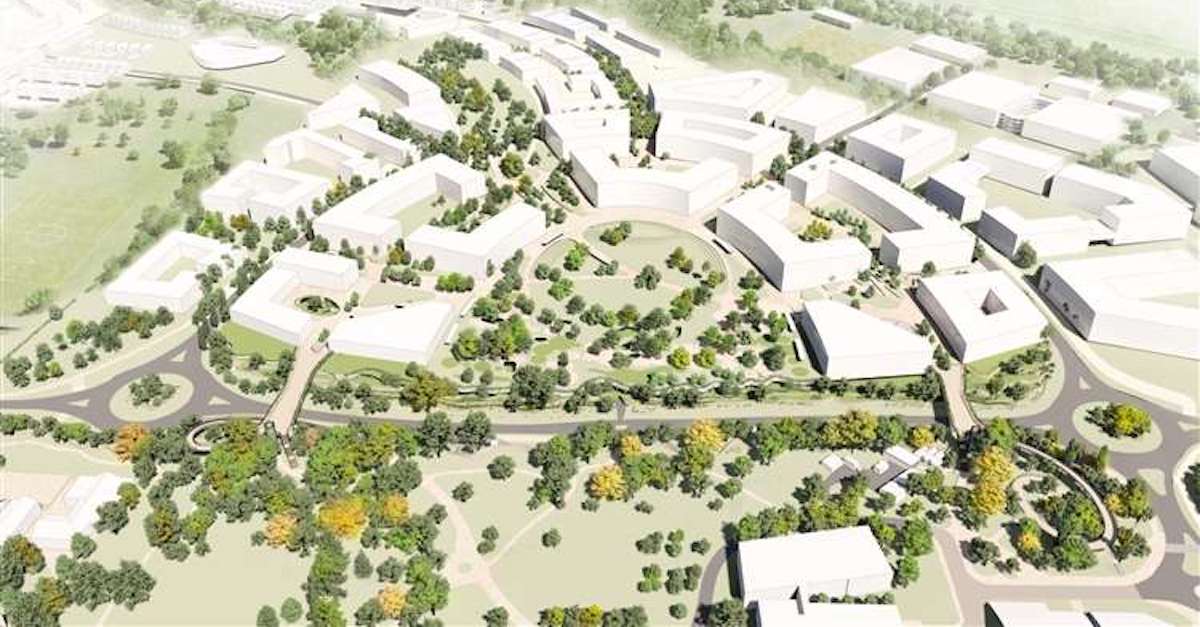Wellcome has approved funding for the first phase in the huge expansion of Genome Campus in Hinxton, set to triple in size.
The UK’s largest biomedical charity said the growth would secure the site’s status as a “world-leading hub for genomics and biodata”.
Wellcome said its board had allocated “hundreds of millions of pounds” from its investment portfolio for the expansion, with some estimates predicting the development will cost more than £1bn.
The first phase alone represents “one of the largest contemporary investments in the UK’s life sciences infrastructure” and will deliver lab space, homes, amenities and enable future development across the 315-acre expansion site.
The plot is between the A1301 and the A11, on the other side of the road from the existing campus, which is home to the Wellcome Sanger Institute, the European Molecular Biology Laboratory’s European Bioinformatics Institute (EMBL-EBI) and the BioData Innovation Centre, which houses a range of start-up companies as part of the site’s genomics and biodata community.
Detailed building designs are due to be developed this year, with the first buildings due for completion in early 2026.
Planning permission was granted in early 2021 by South Cambridgeshire Council, although there were concerns from many local villages about the scale of the development on what is mainly agricultural land, and its impact on traffic.
Councillors determined that the scientific and economic value of what was being proposed outweighed those concerns and welcomed the investment in creating affordable homes for those working on site.
The expansion is aimed at attracting “a range of occupiers from start-ups and scale-ups to more mature organisations, growing and enhancing the existing scientific ecosystem” with the ultimate aim of translating genomics and biodata research into real-world solutions for health challenges.
It will generate a return for the charity to continue investing in science.
Wellcome and the on-site team are working with Urban & Civic, the development company the charity acquired in 2021, on the plans for phase one, during which the campus will more than double in size.
Wellcome says the first phase will create 180,000 sq ft of new research space, a gym and swimming pool and shops and cafes for the local community and people on campus.
Around 400 of the 1,500 total planned homes for people working on the site, which will also incorporate an electrical grid connected to a new substation that will support renewable generation on site, along with other enabling work, roads and parking to underpin the expansion of the campus.
Transport infrastructure will also be upgraded, including to local road and cycle networks and new habitats for wildlife will be created along with increased biodiversity in areas open to the local community and integrated into existing wetlands.
Wellcome says the expansion comes at a time when there is much-needed capacity for biosciences, underlined by the pivotal role played by the Sanger Institute during the Covid pandemic, when it helped to track the variants.
Developments to help treat various cancers, the diagnosis of rare genetic diseases and early warning signs for infectious disease outbreaks have also stemmed from genomics pioneered on site.
Future phases will deliver a further 1.4 million sq ft of laboratory and research space, plus the remaining homes, amenities, community facilities and a primary school.
It plans “low-carbon methods of construction” and is investigating the best use of renewable energy on site. It aims for the development to be net zero in operation.
Nearly 3,000 people currently work on the campus, which will eventually support between 7,000 and 9,000 jobs.
Julia Gillard, chair of Wellcome, said: “Bringing great researchers together to share ideas and inspire one another is one of the best ways to cultivate new discoveries. Scientists at the Wellcome Genome Campus have already made remarkable contributions to our knowledge of life and health. Growing the campus now will accelerate advances and change even more lives for the better around the world.”
Matt Hurles, director of the Wellcome Sanger Institute, said: “Expanding the campus will create opportunities to catalyse additional collaborations, so that we can continue to do innovative science at scale to overcome the challenges facing society. It is only by working together that we can continue to push the boundaries of what’s possible in genome research – from finding new ways to understand and treat cancer, to helping provide children with rare genetic disorders with a diagnosis for the first time.”
Paul Schreier, interim chief executive of Wellcome, said: “This is a major milestone in the growth of the Wellcome Genome Campus, cementing its position as a world-leading genetics and biodata hub.
“As a charitable foundation we think about the long term when we’re investing. For the campus expansion, that means sustainability in every sense is crucial to us because we expect to be looking after it for decades to come.”
Ewan Birney, director of the European Bioinformatics Institute, said: “Few places are as vibrant as the Wellcome Genome Campus, which brings together first-class research and open data resources that the global scientific community relies on. The concentration of expertise on the Wellcome Genome Campus meant that EMBL chose to establish its European Bioinformatics Institute on this site over 25 years ago.
“In that time our data resources have grown dramatically and an evaluation found that EMBL-EBI data and services contributed to the wider realisation of future research impacts worth £2.2 billion annually in 2021. This reflects the importance of open data to the discoveries of tomorrow.”
Adrian Ibrahim, senior vice president, operations and alliances at Mosaic – a resident member at the BIC – said: “Mosaic Therapeutics Mosaic is applying massive scale genomics and advanced computational capabilities to resolve cancer’s complexity and power a new generation of cancer therapies for patients. For us, the Wellcome Genome Campus provides state of the art infrastructure and the support needed to set up as a start up in the life sciences sector.
“Our position at the campus has enabled us to go through our initial discovery platform and subsequent Series A $28million investment process and as we are expected to grow, we welcome the campus expansion, which we hope will enable us to expand even further.”
© Eastern Echo (powered by ukpropertyforums.com).
Sign up to receive our weekly free journal, The Forum here.









